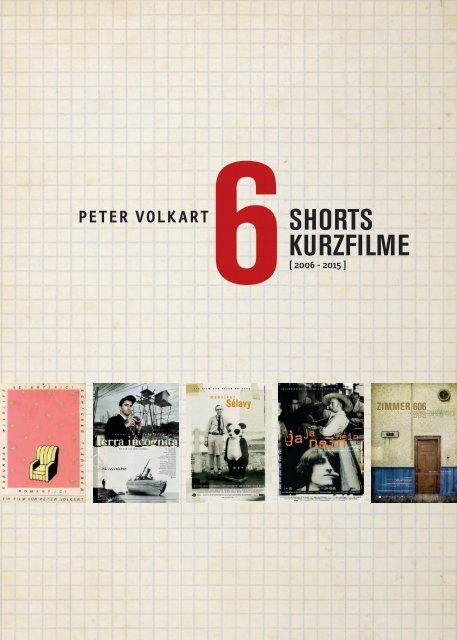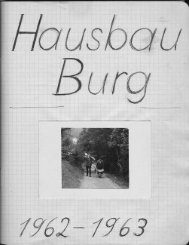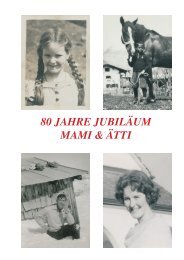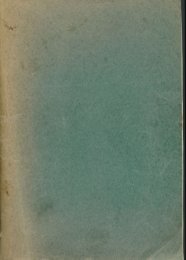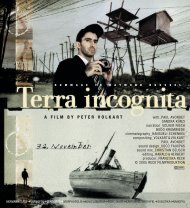You also want an ePaper? Increase the reach of your titles
YUMPU automatically turns print PDFs into web optimized ePapers that Google loves.
H O M M A G E à R A Y M O N D R O U S S E L<br />
Ein Film von PE t E r v olkart<br />
mit_PaUl aVOndEt<br />
sandRa KünZI<br />
erzähler_VOlKER RIsCH<br />
BOdO KRUMwIEdE<br />
kamera_HansUElI sCHEnKEl<br />
compositing_VOlKaRt&VOlKaRt<br />
PaUl aVOndEt<br />
sound design_VOCO FaUxPas<br />
mischung_CHRIstIan BEUsCH<br />
montage_HaRald & HERBERt<br />
produzentin_FRanZIsKa RECK<br />
© 2005 RECK FIlMPROdUKtIOn<br />
Unterstützt durch: Bundesamt für Kultur (EdI)<br />
stadt und Kanton Zürich, Migros Kulturprozent re:view<br />
Familien-Vontobel-stiftung, dr. adolf streuli-stiftung<br />
Ernst und Olga Gubler-Hablützel stiftung, Volkart stiftung<br />
stiftung Birsig für Kunst und Kultur<br />
Friedrich-Jezler-stiftung<br />
HERMannstadt)taRnOPOl)ZEROGRad)MORPHOPOlIs)nOVOsUBURBIa)PORt OKaPI)KaRFUnKEl-aRCHIPEl)sUBOtIKa)nanOPOl<br />
poster selavy 25.9.2008 13:22 Uhr Seite 1<br />
E I N F I L M V O N P E T E R V O L K A R T<br />
MIT HEINZ-JÜRGEN STEINHAUER | RUTH SCHWEGLER | ADRINE ARMAN | PETER BEECK<br />
BUCH & REGIE PETER VOLKART KAMERA HANS ULRICH SCHENKEL SCHNITT HARALD & HERBERT COMPOSITING PAUL AVONDET<br />
PODUKTIONSLEITUNG ANITA HANSEMANN BAUTEN MARKUS SCHMID | MICHAEL SEEGER MIX GUIDO KELLER<br />
PRODUKTION RECK FILMPRODUKTION UNTERSTÜTZT DURCH MIGROS KULTURPROZENT<br />
www.manufaktura.ch<br />
Peter Volkart<br />
6[ 2006 - 2015 ]<br />
SHORTS<br />
KURZFILME<br />
monsieur<br />
Sélavy<br />
T H E W A Y I T I S
„Reality is only<br />
part of the possible.“<br />
Friedrich Dürrenmatt<br />
In the fantastical short films of Peter Volkart, the viewer rubs his<br />
eyes in wonderment and does not know to what category they belong.<br />
Are they retro-science fiction, or films of the absurd? The<br />
poet Raymond Roussel greets us from afar (and yet at the same<br />
time so close) – a precursor of the Surrealists whose imaginary<br />
travels through Africa could have been their inspiration and initiation.<br />
If we were to throw Dadaist photomontage, surreal collages and<br />
the hallucinatory visions of a Roussel into a kind of digital hat – or<br />
perhaps into an electronic mincing machine – and then add the<br />
aesthetic heritage of socialism (especially of the musty, GDR kind)<br />
and spice up the whole mixture with a generous portion of foundfootage<br />
clips from weekly newsreels: then we would achieve the<br />
most abstruse visual concoctions that are typical of Volkart.<br />
The director invites his viewers along on a poetic journey of exploration.<br />
Boundaries are explored, crossed, and left behind us. With<br />
intellectual verve we penetrate together that intermediary zone between<br />
the unconscious and real consciousness; the space-time<br />
continuum is interrupted and parallel universes open themselves<br />
up to the time-travelling dabbler. In these animated projections,<br />
forgotten spaces are opened up and the viewer soars away into<br />
never-discovered wonderlands beyond existence. The unsuspecting<br />
voyager/voyeur visits transcendental cities and imaginary landscapes<br />
until he reaches a zero gravity point and is swallowed up<br />
into a black hole.<br />
Volkart’s digital icon sampling in the computer corresponds to the<br />
writing technique developed by Raymond Roussel that is based<br />
on word plays and sound associations. The pataphysical creative<br />
potential of Peter Volkart – film-maker and image-maker – breaks<br />
the bounds of the sedate Swiss average to an astronomic degree.<br />
His magical films are like amber stones in which insects have been<br />
trapped for millennia, and they delight one like the white Alba truffles<br />
whose taste reveals itself only to connoisseurs.<br />
Thomas Pfister<br />
Media scientist, cultural mediator, curator, publicist<br />
Head of Cinema at the Bern Art Museum 1983-2003<br />
Lecturer at the Bern/Biel School of Design<br />
2
„Die Wirklichkeit ist<br />
nur ein Teil des Möglichen.“<br />
Friedrich Dürrenmatt<br />
Bei den fantastischen Kurzfilmen von Peter Volkart reibt sich der<br />
Zuschauer verwundert die Augen und weiss nicht, in welche Filmkategorien<br />
sie einzuordnen sind: Eher in die Schublade der Retro-<br />
Science-Fiction oder die des absurden Films? Oder in andere,<br />
noch zu erfindende Kategorien des abseitigen Films? Von fern und<br />
doch so nah grüsst der Dichter Raymond Roussel, ein Vorläufer<br />
der Surrealisten, dessen imaginäre Reise durch Afrika Inspiration<br />
und Initiation gewesen sein kann.<br />
Gibt man die dadaistischen Fotomontagen und die surrealistischen<br />
Collagen mit den halluzinierenden roussel’schen Visionen<br />
zusammen in einen digitalen Bildmischer, eine Art elektronischen<br />
Fleischwolf, fügt man weiter das ästhetische Vermächtnis<br />
des Sozialismus, insbesondere der miefigen DDR hinzu, würzt<br />
das Ganze mit einer grosszügigen Portion von Found-Footage-<br />
Wochenschauschnipseln, so werden die abstrusesten wunderbaren<br />
volkart’schen Bildschöpfungen generiert.<br />
Der Cinéast lädt den Zuschauer zu einer poetischen Reise des<br />
Erforschens ein, Grenzen werden ausgelotet, überschritten und<br />
hinter sich gelassen. Mit intellektuellem Elan dringt man in die intermediäre<br />
Zone zwischen Unbewusstem und realem Bewusstsein<br />
ein, die Kontinuität von Raum und Zeit wird aufgehoben und die<br />
Paralleluniversen öffnen sich dem zeitreisenden Dilettanten. In diesen<br />
animierten Projektionen werden vergessene Räume geöffnet<br />
und der Betrachter entschwebt in nie entdeckte Wunderländer jenseits<br />
der Existenz. Der arglose Voyageur/Voyeur besucht transzendente<br />
Städte und imaginäre Landschaften, bis einen am Nullpunkt<br />
der Gravitation ein schwarzes Loch verschlingt.<br />
Das volkart’sche digitale Ikonen-Sampling im Computer entspricht<br />
der von Raymond Roussel entwickelten Schreibtechnik,<br />
der Wortspiele und Klangassoziationen zu Grunde liegen. Das<br />
pataphysische Kreativitätspotential des Filmemachers und Bilderschöpfers<br />
Peter Volkart sprengt den behäbigen eidgenössischen<br />
Durchschnitt um astronomische Potenzen. Seine magischen Filme<br />
gleichen Bernsteinen, in denen Insekten seit Jahrtausenden eingeschlossen<br />
sind, und sie verzücken wie die weisse Alba-Trüffel,<br />
deren Geschmack sich allein dem Connaisseur eröffnet.<br />
Thomas Pfister<br />
Medienwissenschaftler, Kulturvermittler, Kurator, Publizist<br />
1983-2003 Leiter Kino im Kunstmuseum Bern<br />
Lehrer an der Schule für Gestaltung Bern und Biel<br />
3
“Zimmer 606” Warteraum für Personal<br />
4
Mr. Volkart’s cabinets of wonders<br />
“Terra Incognita”<br />
Igor Leschenko passiert Morphopolis<br />
(Paul Avondet)<br />
“Ja ja, Nein nein”<br />
Der Künstler Kurt Bachofen (Heinz Jürgen Nutz)<br />
In the capital city of Surabaya, hotel meals are delivered directly<br />
to the room via pneumatic post. A little farther north, in the small<br />
town of Petrograd, the surrounding region is so rich in mineral<br />
resources that hair oil and shoe polish is pumped directly out of<br />
the ground. And at the Lunaport aerospace base, steam-driven<br />
rockets are waiting for their first mission into space.<br />
Welcome to the outlandish island of Subotika, the most recent<br />
destination in the repertoire of the Swiss world explorer Peter<br />
Volkart. What the 57-year-old has created in his award-winning<br />
films is fantastic in every respect: they are journeys of the mind<br />
that transport us to imaginary realms. This man from the small<br />
country of Switzerland fabricates in his short stories entire<br />
worlds sweeping so far they rarely fit on a map.<br />
In most cases, his characters are explorers,<br />
at times even explorers against their will. For<br />
instance, the inventor of the “Magnetodrom”<br />
in quest of the legendary anti-gravity (“Terra<br />
Incognita,” 2006). Or the eccentric artist from<br />
the Swiss provinces who, on a failed self-experiment,<br />
catapults himself to the moon, where<br />
he henceforth grows vegetables and works<br />
on his sculptures made of lunar basalt, far<br />
removed from the public eye and state support<br />
for culture (“ja ja, nein nein,” 2010). Or<br />
the travelling salesman peddling glass eyes<br />
who manages to get the last vacant room in<br />
a run-down hotel. Unbeknownst to him, the<br />
inner workings of the apparatuses in this establishment<br />
are covert, for dwelling inside<br />
the clock and television are tiny beings that<br />
keep them running, like in a miniature totalitarian<br />
state (“Zimmer 606,” 2012).<br />
This is typical for Volkart, this surreptitious<br />
surrealist of Swiss filmmaking: “Zimmer<br />
606” is a convoluted masterstroke made up<br />
of parallel universes. It feeds on an old childhood<br />
fantasy – the notion that dwarf-like beings crouched inside<br />
the radio are making the music and reciting the news. Volkart<br />
utilises the small scale of the short film to navigate through a<br />
cosmos that unfailingly pushes the boundaries of what we learned<br />
to call reason and reality.<br />
5
In the case of his latest film “Subotika” (2014), Volkart goes back<br />
to his own fictitious geography: an island called Subotika had<br />
already appeared in “Terra Incognita.” The fact that he has now<br />
bestowed an entire cinematic journey upon this island is due<br />
to a Bulgarian tourism film from 1979 he accidentally stumbled<br />
across on the Internet in 1979. The seemingly random sequence<br />
of touristic impressions underscored with tacky easy listening<br />
music inspired him to create a remake, as he puts it. And sure<br />
enough, Volkart’s remake is more like a fantastically skewed, yet<br />
tender persiflage on tourism advertising which in fact completely<br />
defeats the purpose – but in an absolutely sublime manner.<br />
Thus we accompany Elfriede and Herbert, newlyweds on their<br />
honeymoon here in this country improbably suitable for romantic<br />
forays. Although the narrator in voiceover stoically maintains the<br />
contrary, he himself does not seem to really believe the hackneyed<br />
tourism marketing slogans he continually discharges.<br />
Furthermore, the black crater in the Subotikan mountains with,<br />
reportedly, a tunnel leading straight through the earth directly<br />
to Paris. This, too, is to be taken symbolically: Subotika, the flip<br />
side of the city of love; a dismal, yet somehow enchanted spot<br />
on the other side of the world.<br />
Like in all of his films, Peter Volkart conceived the enchanting<br />
gloom surrounding Subotika in magnificently faded colours. In<br />
doing so, he kindles nostalgia for a world in a post-Soviet look,<br />
appearing anything but paradisiacal. His films are a bit like the<br />
exquisite animated canapés that Igor, the Subotikan chef, serves<br />
in his bistro: everything looks as if it were preserved in aspic.<br />
A confirmed nostalgic? Volkart answers with a smile and pretends<br />
he has not heard the question. Wearing his flat cap, he<br />
looks a little like the friendly clerk in a fantasy government agency<br />
that would still need to be invented. But Volkart is not simply<br />
an ingenious fantast. He is a collector who is talked into some of<br />
his stories, so to speak, by the objects he gathers. In his films he<br />
fabulates entire worlds from findings that only exist in his head.<br />
In the past, he frequented flea markets to buy old photographs<br />
and film reels from private archives and then ascribe his own<br />
stories in the montage; nowadays it’s a lot more convenient via<br />
Internet.<br />
It comes as no surprise then that to a large extent “Subotika” is<br />
also made up of stock footage of landscapes which he composed<br />
on the computer, creating these fantastic tableaux vivants<br />
6
7
in which hidden charms can still be discovered even upon third<br />
and fourth viewing. As in the case of Plutonia, the cruise liner run<br />
aground in “Subotika” with a reservoir tower and a dilapidated<br />
tenement rising up from the deck, but actually have no business<br />
being there, at least according to our mundane logic. Could one<br />
say that Peter Volkart is a tinkerer? “There is a more elegant<br />
word for it,” he corrects, kindly. “I prefer bricoleur.” And it is indeed<br />
closer to the esprit of the surrealists, tangible in all of his films.<br />
This esprit can also be felt in his studio at the edge of Zurich,<br />
comprised of an editing room and a spacious atelier. As a visitor,<br />
it feels at times as if one might have slipped through a wormhole<br />
and entered a wonder cabinet. Under the elegantly ornate<br />
nameplate from Igor’s bistro, a prop from “Subotika,” one also<br />
finds a small aquarium, jutting out from the wall. In it floats an<br />
eyeless, whale-like chimera, and if you get too close, it lets a few<br />
air bubbles loose.<br />
But how does Peter Volkart find the balance between commissioned<br />
works and his own short films? Very simple: “I work on the<br />
commissions in the morning, and on my films in the afternoon.”<br />
He learned the craft of filmmaking long ago in New York: in the<br />
early eighties he studied art at the School of Visual Arts, in addition<br />
to attending film courses at the New York University. After<br />
that, he found his way much later from object art to film – also<br />
thanks to digitalisation. For however nostalgically fitted out his<br />
films may be, Volkart raves about the abundance of digital tools<br />
on the computer affording him complete freedom in image processing.<br />
“But in the atelier,” he says, pointing over there, “the<br />
wood shavings still fly.”<br />
8
The films by Peter Volkart therefore celebrate a wondrous marriage<br />
of digital technology and analogue craft as well. And apropos<br />
of nothing, he also refutes two persistent prejudices about<br />
makers of short films: he is no longer that young, nor does he<br />
dream of a feature-length work. He is beginning to feel a little<br />
strange when applying for grants: “A lot of people still consider<br />
short films a student’s medium.” Such being the case, his latest<br />
film was also a godsend for him, because he was able to finance<br />
“Subotika”, a co-production with Swiss television, almost solely<br />
with prize money and incentive payments: “If I had had to submit<br />
a grant application for the remake of an old Bulgarian tourism<br />
film, it would never have gone through!”<br />
Florian Keller<br />
(born 1976) is a film critic and culture editor at WOZ - Die Wochenzeitung, a Swiss weekly based<br />
in Zurich. He is the author of “Andy Kaufman: Wrestling with the American Dream” (University of<br />
Minnesota Press, 2005).<br />
9
Suburban Wildlife - Schickes Tierleben [2007]
Suburban Wildlife<br />
Schickes Tierleben<br />
Short Film, without dialogue, color, super-8, 3 min, 1983 remastered 2007<br />
A rare glimpse into the life of a suburban mouse, living the lavish and<br />
sumptuous lifestyle of the rich and famous. Nifty architecture,<br />
high life and romance at its best. The film is the documentation of<br />
an installation that was exhibited in a New York gallery in 1983.<br />
Legendary Kodachrome Super-8 movie from the early 80ties.<br />
A restored and digitally remastered version from the Institute<br />
of Pataphysics. 100% Scientific & romantic!<br />
Aus dem Leben einer in Saus und Braus lebenden Vororts-Maus.<br />
Schicke Architektur, Highlife und Romantik vom Feinsten.<br />
Der Film ist ein Dokument einer Installation, die 1983 in einer<br />
Galerie in New York gezeigt wurde.<br />
Legendärer Kodachrome Super-8 Kultfilm aus den 80er Jahren.<br />
Restaurierte und digitalisierte Fassung des Instituts für Pataphysik.<br />
100% Scientific & romantic!<br />
Scènes de la vie d’une souris périurbaine menant grand train.<br />
De l’architecture superbe, des goûts de luxe et du romantisme pur et dur.<br />
Le film est un document d‘une installation exposée dans une gallérie<br />
new-yorkaise en 1983.<br />
Un film de culte légendaire en Kodachrome Super-8 datant des années<br />
80. Version restaurée et numérisée par l’Institut de Pataphysique.<br />
100 % scientifique & romantique !<br />
Re-Edition<br />
of the Super-8<br />
Classic !<br />
11
Terra Incognita [2005]<br />
H O M M A G E à R A Y M O N D R O U S S E L<br />
Ein Film von PE t E r v olkart<br />
mit_PaUl aVOndEt<br />
sandRa KünZI<br />
erzähler_VOlKER RIsCH<br />
BOdO KRUMwIEdE<br />
kamera_HansUElI sCHEnKEl<br />
compositing_VOlKaRt&VOlKaRt<br />
PaUl aVOndEt<br />
sound design_VOCO FaUxPas<br />
mischung_CHRIstIan BEUsCH<br />
montage_HaRald & HERBERt<br />
produzentin_FRanZIsKa RECK<br />
© 2005 RECK FIlMPROdUKtIOn<br />
Unterstützt durch: Bundesamt für Kultur (EdI)<br />
stadt und Kanton Zürich, Migros Kulturprozent re:view<br />
Familien-Vontobel-stiftung, dr. adolf streuli-stiftung<br />
Ernst und Olga Gubler-Hablützel stiftung, Volkart stiftung<br />
stiftung Birsig für Kunst und Kultur<br />
Friedrich-Jezler-stiftung<br />
HERMannstadt)taRnOPOl)ZEROGRad)MORPHOPOlIs)nOVOsUBURBIa)PORt OKaPI)KaRFUnKEl-aRCHIPEl)sUBOtIKa)nanOPOl<br />
12
Hommage à Raymond Roussel<br />
Short Film, Fiction, German, 35mm, 18 min, Switzerland 2005<br />
Production: Reck Filmproduktion, Zürich<br />
He was in the headlines for a brief period in the late 1920s:<br />
Igor Leschenko, the young physicist from Hermannstadt, whose bizarre<br />
experiments cast doubt upon the law of gravity. The debacle at the<br />
pataphysicist convention leads to a secret expedition to the point of<br />
zero gravity. Rare film documents of a hazardous journey beyond<br />
Zentropa through the Karfunkel archipelago.<br />
Will Leschenko ever find the Nanopol island?<br />
Ende der 20er Jahre war er kurz in den Schlagzeilen:<br />
Igor Leschenko, der junge Physiker aus Hermannstadt, der mit seinen<br />
bizarren Experimenten das Gesetz der Schwerkraft ins Wanken bringt.<br />
Das Debakel am Kongress der Pataphysiker führt zu einer geheimen<br />
Expedition zum Antigravitätspunkt. Rare Filmdokumente einer Reise<br />
jenseits von Zentropa durch den bedrohlichen Karfunkel-Archipel.<br />
Wird Leschenko die Insel Nanopol je finden?<br />
Il a brièvement fait les gros titres à la fin des années 20:<br />
Igor Leschenko, le jeune physicien d’Hermannstadt qui avait ébranlé<br />
la loi de la gravité avec ses expériences bizarres, c’est lui. La débâcle au<br />
congrès des pataphysiciens fut suivie d’une expédition secrète jusqu’au<br />
point d’anti-gravité. Des films documentaires rares retracent un voyage<br />
au-delà de Zentropa à travers l’archipel menaçant de Karfunkel.<br />
Igor Leschenko découvrira-t-il l’île Nanopol?<br />
Terra Incognita participated in over 80 international Festivals<br />
and received more than 15 Prizes:<br />
Winner BEST SHORT FILM Festival Int. des Films du Monde - Montréal 2005<br />
Winner Swiss Film Prize 2006 BEST SHORT FILM<br />
Winner BEST SHORT FICTION FILM Festival Int del Cortometraggio di Siena 2005<br />
Nomination MÉLIÈS D’OR (European Fantastic Film Festivals Federation – EFFFF)<br />
Winner BEST SHORT FILM Festival Int. du Film Fantastique de Neuchâtel 2005<br />
Winner BEST SHORT FILM Zürcher Filmpreis 2005 – Zurich Film Award 2005<br />
Winner BEST SHORT FILM – FIPA D’OR Festival Int. FIPA Biarritz 2006<br />
13
Monsieur Sélavy - The Way it is [2008]<br />
E i n F i l m v o n P e t e r V o l k a r t<br />
monsieur<br />
Sélavy<br />
T H E W A Y I T I S<br />
Mit Heinz-Jürgen Steinhauer | Ruth Schwegler | Adrine Arman | Peter Beeck<br />
Buch & Regie Peter Volkart Kamera hans Ulrich Schenkel Schnitt harald & Herbert compositing paul avondet<br />
Poduktionsleitung Anita Hansemann Bauten Markus Schmid | Michael Seeger mix guido keller<br />
produktion RECK FiLMproduktion unterstützt durch Migros Kulturprozent<br />
www.manufaktura.ch<br />
14
monsieur<br />
T H E W A Y I T I S<br />
Sélavy<br />
Short Film, Fiction, 35mm, 10 min, Switzerland 2008<br />
Production: Reck Filmproduktion, Zürich<br />
On the move with Monsieur Sélavy.<br />
A film diary about the vicissitudes of existence and how to encounter<br />
them with dignity. A journey in which space and time coordinates<br />
become a bit tangled...<br />
Unterwegs mit Monsieur Sélavy.<br />
Ein Filmtagebuch über die Wechselfälle und Schieflagen des Daseins<br />
und wie man ihnen mit Würde begegnet. Ein Reise, bei der Raumund<br />
Zeitkoordinaten etwas durcheinander geraten...<br />
En route avec Monsieur Sélavy.<br />
Un journal filmé sur les vicissitudes de la vie, les aléas des parcours et<br />
la manière de les aborder avec dignité. Un voyage où le temps et l‘espace<br />
se conjuguent au-delà des coordonnées...<br />
Monsieur Sélavy participated in over 45 international Festivals and was<br />
nominated for Swiss Film Prize 2009 – Best Short Film<br />
15
Ja ja, Nein nein [2010]<br />
16
ja ja,<br />
nein nein<br />
A Film BY Peter Volkart & Ulrich Schaffner<br />
Short Film, Docu-Fiction, German, HDcam, 19 min, Switzerland 2010<br />
Production: unico film, Zürich in cooperation with the Aargauer Kuratorium<br />
Should the government get involved in promoting and funding the arts?<br />
In the <strong>Six</strong>ties this question was avidly discussed in the small, sedate<br />
Swiss Canton of Aargau.<br />
Ja ja, Nein nein (yea yea, nay nay) – A film about a visionary patron<br />
of the arts, a performance artist who mysteriously disappears and<br />
a unique arts funding scheme.<br />
Soll sich der Staat in die Kulturförderung einmischen? In den sechziger<br />
Jahren wurde diese Frage im beschaulichen Schweizer Kanton<br />
Aargau hitzig diskutiert.<br />
Ja ja, Nein nein – Ein Film über einen visionären Kulturförderer, einen<br />
verschollenen Aktionskünstler und ein bahn brechendes Kulturgesetz.<br />
Ein Stück Schweizer Kulturgeschichte.<br />
Le gouvernement doit-il s’impliquer dans la promotion de la culture?<br />
Dans les années soixante, cette question était au cœur d’un débat<br />
ardent dans le doux Canton suisse d’Argovie.<br />
Ja ja, Nein nein (oui oui, non non) – Un film sur un promoteur visionnaire<br />
de la culture, sur la disparition mystérieuse d’un artiste performer<br />
et une loi culturelle révolutionnaire.<br />
Ja ja, nein nein was the winning project commissioned by the Aargau Endowment<br />
for the Arts 2009 to celebrate its the 40th anniversary.<br />
Ja ja, nein nein participated in the official selection Clermont-Ferrand 2010,<br />
Huesca 2010, Zinebi Bilbao 2010, Interfilm Berlin 2010, Expression en Corte, Mexico<br />
2010 (among others)<br />
17
Zimmer 606 [2012]<br />
Zimmer 606606e i n f i l m V o n P e t e r V o l k a r t<br />
CHAMBRe<br />
THE END OF TIME<br />
phil hayes | max merker<br />
francesca tappa | helmut vogel | heinz-Jürgen steinhauer | peter beeck<br />
Buch & Regie Peter Volkart<br />
RegieAssistenz anita Hansemann KAmeRA Hans UlricH scHenkel<br />
set Design markUs scHmid | Valentin kemmner<br />
Licht salVatore Piazzitta montAge Harald & Herbert<br />
musiK bleHmUzik & niHad HrUstanbegoVic | orkester ben jeger<br />
sounD mix gUido keller PostPRoDuKtion PaUl aVondet PRoDuKtion franziska reck<br />
eine reckfilm PRoDuKtion in KoPRoDuKtion mit srf | srg<br />
mit finanzieller UnterstützUng Von bUndesamt für kUltUr, zürcHer filmstiftUng, kUratoriUm des kantons aargaU,<br />
sUccès Passages antennes, sUccès züricH, ernst göHner stiftUng, stage Pool focal, filmtecHniker kollektiV ftk<br />
18
Zimmer 606<br />
[ ROOM 606 ]<br />
CHAMBRE 606<br />
Short Film, 35mm, 15 min, Switzerland 2012<br />
Production: Reck Filmproduktion, Zürich in coproduction with SRF-SRG<br />
The travelling salesman Jonathan Fisch peddles glass eyes. His journey<br />
takes him to the edge of the province, where he checks in to a run-down<br />
hotel. The attic room number 606 has its pitfalls. Something rather<br />
peculiar is happening beyond the wall. Jonathan Fisch can expect a<br />
very turbulent night. A night that begins one evening in late autumn<br />
and doesn’t end until spring.<br />
Der Handlungsreisende Jonathan Fisch hausiert mit Glasaugen. Die Reise<br />
führt ihn an die Ränder der Provinz, wo er in einem heruntergekommenen<br />
Hotel absteigt. Das Mansardenzimmer Nr. 606 hat seine Tücken. Denn<br />
jenseits der Wände geht Sonderbares vor sich. Eine unruhige Nacht<br />
steht Jonathan Fisch bevor, die im Spätherbst beginnt und<br />
erst im Frühling endet.<br />
Le représentant de commerce Jonathan Fisch fait du porte-à-porte pour<br />
vendre des yeux de verre. Ses déplacements le conduisent aux confins<br />
de la province, où il passe la nuit dans un hôtel miteux. La chambre<br />
mansardée numéro 606 lui réserve quelques fourberies. De l’autre côté<br />
des murs, il se passe en effet de drôles de choses. Jonathan Fisch doit<br />
s’attendre à une nuit agitée, qui commence à la fin de l’automne et se<br />
termine au printemps seulement.<br />
Zimmer 606 participated in over 80 international Festivals<br />
and received more than 8 Prizes:<br />
Winner - Best Swiss Short Film Neuchâtel Int. Fantastic Film Festival NIFFF 2012<br />
Winner - Best European Fantastic Short Film 2012, Sitges 2012<br />
Nomination - Best Script 6 th Grand OFF World Independent Film Awards 2012<br />
Winner - Best Short Film Hong Kong international Film Festival 2013<br />
19
Subotika – Land of Wonders [2015]<br />
A SHORT FILM BY PETER VOLKART<br />
Book right now!<br />
Subotika, the holiday destination that lives up to its promises.<br />
20
Short Film, Fiction, DCP, 14 min, Switzerland 2015<br />
Production: Reck Filmproduktion, Zürich<br />
LAND OF WONDERS<br />
Subotika, a little-known island on the other side of the globe.<br />
Endeavouring to step up tourism in the Republic, the Foreign Minister<br />
commissions an advertising movie. An enchanting country with extraordinary<br />
sights, grand visions and a couple of minor problems.<br />
Subotika, eine kaum bekannte Insel auf der anderen Hälfte der Erdkugel.<br />
Um den Fremdenverkehr der Republik anzukurbeln, gibt der Aussenminister<br />
einen Reklamefilm in Auftrag. Ein Filmwerk über ein zauberhaftes<br />
Land mit aussergewöhnlichen Sehenswürdigkeiten, grossartigen Visionen<br />
und ein paar geringfügigen Problemen.<br />
Subotika, une île peu connue de l‘autre côté du monde. Désireux de renforcer<br />
le tourisme dans la République, le Ministre des Affaires Étrangères<br />
passe commande pour un film publicitaire. Un pays charmant: des vues<br />
extraordinaires, de belles perspectives... et quelques problèmes mineurs.<br />
21
PETER VOLKART studied visual arts and filmmaking in Zurich and New York.<br />
In addition to making independent short films and documentaries for television,<br />
as art director and editor he has also created trailers and commercial shorts and<br />
collaborated on numerous feature film projects. Since 2002 he runs a graphic<br />
design studio in Zurich specializing in motion graphics, special effects<br />
and all kinds of mixed media productions.<br />
Besides working commercially Peter Volkart has had various exhibitions in<br />
art galleries and art museums in Switzerland and abroad.<br />
Filmography<br />
Zimmer 606 (short film, fiction, 15 min, 2012)<br />
Ja ja, Nein nein (co-director, docu-fiction, 20 min, 2009)<br />
Monsieur Sélavy – The Way It Is (short film, fiction, 10 min, 2008)<br />
Terra Incognita (short film, fiction, 18 min, 2005)<br />
En Route... (short film, TV-documentary, 25 min, 2001)<br />
Crosstown (short film, TV-documentary, 25 min, 1994)<br />
Der junge Eskimo (short film, experimental/fiction, 40 min, 1986)<br />
Mongolia (short film, experimental/fiction, 28 min, 1984)<br />
Ein Zwischenfall (short film, experimental, 28 min, 1983)<br />
Suburban Wildlife (short film, experimental/documentary, 3 min, 1983)<br />
22<br />
Subotika – Land of Wonders – Kosmodrom Lunaport
See all 6 Films<br />
on Vimeo<br />
23<br />
Room 606 – Emergency exit
www.subotika.ch<br />
24


